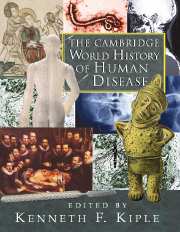Book contents
- Frontmatter
- Introduction
- Part I Medicine and Disease: An Overview
- I.1 History of Western Medicine from Hippocrates to Germ Theory
- I.2 History of Chinese Medicine
- I.3 Islamic and Indian Medicine
- I.4 Disease, Human Migration, and History
- Part II Changing Concepts of Health and Disease
- Part III Medical Specialties and Disease Prevention
- Part IV Measuring Health
- Part V The History of Human Disease in the World Outside Asia
- Part VI The History of Human Disease in Asia
- Part VII The Geography of Human Disease
- Part VIII Major Human Diseases Past and Present
- Indexes
- References
I.3 - Islamic and Indian Medicine
from Part I - Medicine and Disease: An Overview
Published online by Cambridge University Press: 28 March 2008
- Frontmatter
- Introduction
- Part I Medicine and Disease: An Overview
- I.1 History of Western Medicine from Hippocrates to Germ Theory
- I.2 History of Chinese Medicine
- I.3 Islamic and Indian Medicine
- I.4 Disease, Human Migration, and History
- Part II Changing Concepts of Health and Disease
- Part III Medical Specialties and Disease Prevention
- Part IV Measuring Health
- Part V The History of Human Disease in the World Outside Asia
- Part VI The History of Human Disease in Asia
- Part VII The Geography of Human Disease
- Part VIII Major Human Diseases Past and Present
- Indexes
- References
Summary
Islamic and Indian medicine originated in distinct cultural traditions but have been in close contact for many centuries. The terms Islamic and Indian as they refer to medicine do not describe static, idealized, or monolithic systems that can be categorized by referring to the medical texts of a distant golden age. Medical practices in Islamic and Indian cultures were, as elsewhere, eclectic and pluralistic, evolving in response to complex influences that varied according to time and place. This essay briefly traces the origins and the major components of the two traditions and compares and contrasts their institutional responses to the challenges of modern times.
Islamic medicine is based largely on the Greek medical knowledge of later antiquity and is more properly called Greco-Islamic or Galenic-Islamic medicine, reflecting the influence of Galen, whose works dominated medical learning in the eastern Hellenic world. At the time of the Muslim conquests of the seventh century A.D., the major centers of Greek medical learning in the eastern Mediterranean were flourishing.
Because of theological constraints, Greek Orthodox scholars were more interested in the Greek sciences, which included medicine and philosophy, than in literature, historiography, and other humanistic subjects. The Muslim conquerors recognized the excellence of Greek learning, and the Umayyid and Abbasid caliphs subsequently sponsored the translation of a large portion of the available scholarly works into Syriac and Arabic (Ullmann 1978).
- Type
- Chapter
- Information
- The Cambridge World History of Human Disease , pp. 27 - 35Publisher: Cambridge University PressPrint publication year: 1993
References
- 3
- Cited by



